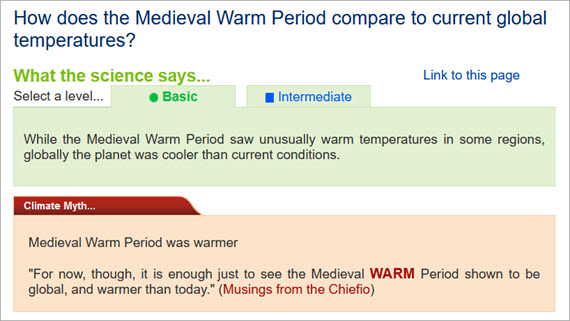At a glance - How does the Medieval Warm Period compare to current global temperatures?
Posted on 21 May 2024 by John Mason, BaerbelW, Ken Rice
On February 14, 2023 we announced our Rebuttal Update Project. This included an ask for feedback about the added "At a glance" section in the updated basic rebuttal versions. This weekly blog post series highlights this new section of one of the updated basic rebuttal versions and serves as a "bump" for our ask. This week features "How does the Medieval Warm Period compare to current global temperatures?". More will follow in the upcoming weeks. Please follow the Further Reading link at the bottom to read the full rebuttal and to join the discussion in the comment thread there.
At a glance
To explore this topic, the first question must surely be: what was the Medieval Warm Period? The answer lies in the dim and distant past, in modern human terms, that is. Compared to the age of the Earth, at 4.5 billion years, it is a fraction of a very small fraction of a blink of the eye. Nevertheless, let's continue.
The period of time known to archaeologists as the Common Era (CE) roughly covers the past 2000 years. Decades ago it was divided into a series of climate epochs. Although there is no firm consensus regarding their precise duration, the 'Roman Warm Period' covered the first few centuries. The 'Dark Ages Cold Period' was from around 400-800 CE, the 'Medieval Warm Period' was from 800-1200 CE and the 'Little Ice-Age' was from 1200-1850 CE.
Each of these climatic epochs has its origin in old pieces of paleoclimatic evidence from the Northern Hemisphere. Decades ago, it was assumed each such epoch must have been global in extent. But since that time, climatology has steadily moved on. More new ways of reconstructing the Common Era climate have been discovered and refined. Coverage has been extended from those few Northern Hemisphere localities to the entire globe.
Thanks to such improvements, we now know that many of these warming and cooling events were regional, not global effects. The evidence no longer supports the idea of epochs of globally coherent and synchronous climate. Yes it was warm in Europe in the Medieval Warm Period. However, it was much cooler, for example, over the Pacific than it is today.
The coldest epoch of the last millennium is known as the Little Ice Age. But here too, the effects were not the same everywhere at the same time, as pointed out in a recent paper published in Nature. Its authors commented that peak cold occurred at widely-spaced locations hundreds of years apart. Coldest temperatures occurred during the fifteenth century in the central and eastern Pacific Ocean. But by the seventeenth century it was coldest in northwestern Europe and southeastern North America.
In contrast the same study found that the warmest period of the past two millennia occurred during the 20th century. The warmth affects more than 98% of the globe. That constitutes solid evidence that modern human-caused global warming is unusual. As the paper says, it is, "unparalleled in terms of absolute temperatures and also unprecedented in global coverage within the past 2,000 years".
Please use this form to provide feedback about this new "At a glance" section. Read a more technical version below or dig deeper via the tabs above!
Click for Further details
In case you'd like to explore more of our recently updated rebuttals, here are the links to all of them:
If you think that projects like these rebuttal updates are a good idea, please visit our support page to contribute!































 Arguments
Arguments































Comments